Estimated reading time: 10 minutes
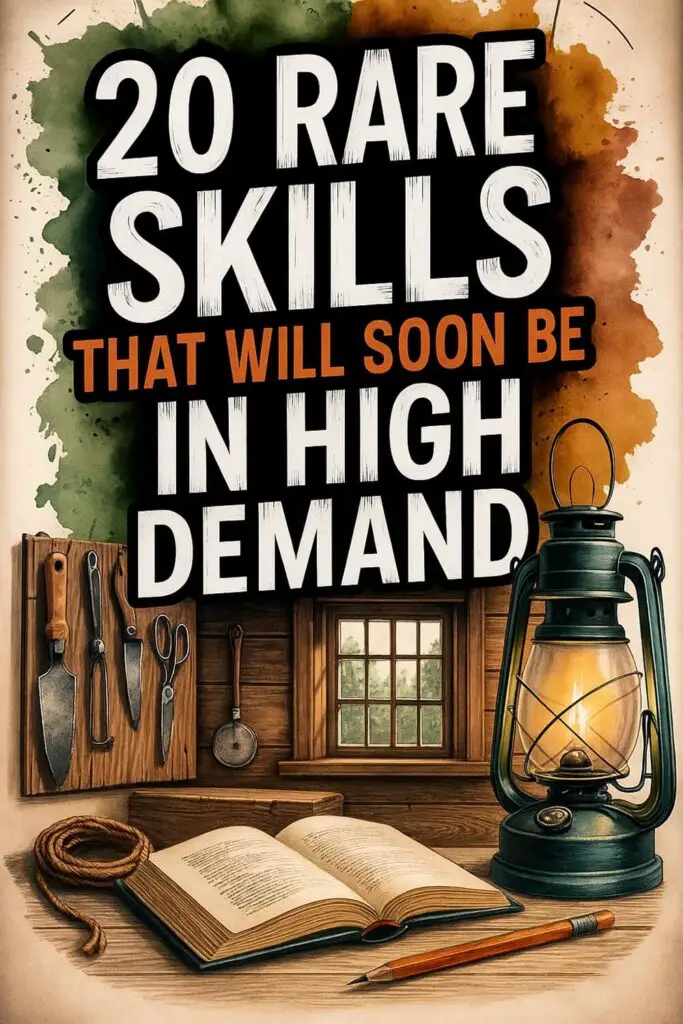
While the industrial revolution and increasing technology have helped our society grow and prosper, many of the things we use today won't be available after an economic or civil demise. Homesteaders need to know and become familiar with these rare skills that will be in high demand after the current economic system collapses.
These skills are those that your grandparents or great grandparents knew. Old stories of how to butcher a chicken or can a bucket of green beans will be important skills in the future. Plenty of modern people today take for granted these older skills that will eventually come back around.
Take a look at these rare skills and commit to learning them now, before it's too late.
1. Beekeeping
This lost art is finding its way back thanks to the recent decline in natural hives. Beekeeping is an important skill to have not only to keep your garden and plants producing but also to feed your own family. Starting a beehive on your homestead strengthens your land and provides a food source for your family that will never spoil.
In a world without synthetic fertilizers or commercial pollinators, having your own hive ensures your crops can thrive naturally. Honey also becomes a valuable bartering item due to its long shelf life, antibacterial properties, and versatility.
Related: Beekeeping for Beginners: How To Set Up A Beehive
2. Blacksmithing
The ability to reshape metal is huge. In fact, it's what caused humanity to leave the stone age behind and enter the bronze age. As modern manufacturing grinds to a halt, people will need durable tools and hardware repaired or custom made. A skilled blacksmith could become one of the most in-demand individuals in any post-collapse community.
However, there's more to it than heating up metal and hitting it with a hammer. To be a successful blacksmith, you need to learn the science behind it and spend lots of time practicing. Once you get the hang of it, you can make things like tools, nails, gates, blades, cauldrons, railings, horseshoes, cooking utensils, candleholders, and more.
Related: Blacksmithing Basics: 7 Things You Need to Know
3. Building a Fire without Matches
Knowing how to start and build a fire without the use of matches is another rare skill that will be in high demand. Being able to create fire from scratch means warmth, cooked food, clean water, and even sterilization—essentials for survival. It’s not just a primitive skill; it’s one of the foundations of human resilience.
Most of us don't know how to make a fire from scratch, let alone a fire without the use of fuel or matches. Learn how to build a fire using manual methods or the power of the sun now so that you'll know how to later.
4. Building a Proper Shelter
Both your family and animals will need shelter, no matter what. Knowing how to build a proper shelter using natural materials will be key for survival in the future. Those who can build safe, insulated shelters will be critical in helping others survive harsh climates.
Practice making a shelter out on your own land now. Understand the difference between a temporary shelter and one that should provide protection from the winter elements long term.
5. Butchering
When it comes to feeding yourself and your family, you will need to know how to kill and butcher animals for meat. Butchering is one skill that we've all grown accustomed to. Many children don't understand that the beautiful chicken breast in the package was once part of a live chicken.
Knowing how to butcher an animal correctly will not only maximize the meat that you harvest but also keep your family safe from doing it wrong and spoiling the meat. And in a barter economy, skilled butchering will be essential not just for personal use but as a service for others. Properly processed meat could also be traded, preserved, or stored, extending food security well beyond harvest time.
6. Candle Making
Without the power grid, electricity will be a rare luxury, especially in remote or rural areas. That’s why knowing how to make your own candles is a vital survival skill. Candles provide one of the few reliable sources of light, essential for navigating your homestead, performing nighttime chores, or administering medical care.
They can also offer a surprising emotional lift, creating warmth and a sense of normalcy during the long, dark winter months.
Related: How to Make a Bacon Fat Candle
7. Canning
While canning has come back into popularity in recent years, it still isn't a skill that many of us know. Canning your own fruits and vegetables from the garden is a vital skill that will keep your family fed during the colder or lean months.
As food scarcity increases, those who can preserve large harvests will have the power to sustain not only themselves but others. Canning will also help reduce food waste and stretch resources through the seasons.
While it may look easy, it is possible to can incorrectly and put your family at risk, so make sure you know what you're doing.
Related: Canning vs Dehydrating: Which Method is Better?
8. Carpentry
The ability to work with wood will be invaluable when modern tools and supplies run out. Carpentry skills allow you to build and repair essential structures like houses, barns, fences, and even furniture. Being able to craft sturdy, functional items from wood could mean the difference between a safe, well-equipped homestead and one that is vulnerable to the elements.
Skilled carpenters could also help build infrastructure for entire communities, from housing to barns to communal gathering spaces. With few alternatives for repairs, this skill turns into a long-term survival necessity.
9. Composting
Maintaining fertile soil will be vital for growing food year after year, and composting is the key to replenishing essential nutrients in your garden. By learning how to turn organic waste like kitchen scraps, animal manure, and yard clippings into rich, fertile compost, you can keep your soil healthy and productive.
Composting also helps retain moisture in the soil, which is critical during droughts or when water is limited. This skill also ensures a sustainable source of nutrient-rich material to feed your crops, even when commercial fertilizers are no longer available.
Related: Composting 101: Read This Before You Start
10. Crochet and Knitting
While crochet and knitting are quaint hobbies now, this skill will be important in the future after a collapse. Learning how to crochet and knit allows you to create useful items from yarn or wool that would be otherwise unusable.
Being able to produce textiles by hand means you won’t have to rely on fragile supply chains for basic necessities. Not only can you make important clothing items, like socks, gloves, and hats, but you can also weave together towels and even large blankets to keep warm in a disaster.
11. Fermentation
Preserving food without refrigeration will be crucial, and fermentation is an ancient method for doing just that. It’s a low-tech, low-resource technique that relies on natural processes rather than electricity or modern equipment. Fermenting vegetables, dairy, and grains not only extends shelf life but also provides essential probiotics that can boost gut health.
Knowing how to ferment foods like sauerkraut, yogurt, or even sourdough bread can help sustain your family through long winters or lean times.
Related: Fermentation 101
12. Foraging
Using the natural resources around your area will be a rare skill to have in the future. This knowledge turns the wilderness into a living pantry and pharmacy. Instead of seeing weeds, you’ll see dinner or medicine waiting to be gathered.
Plenty of plants can be used for food, medicine, and building materials. Identifying and harvesting plants in natural areas is vital to your family's health and well-being after a collapse.
Related: 15 Plants That Are Both Edible AND Medicinal
13. Harvesting Seeds
“Go to seed” isn't a term that many modern people understand. Allowing a plant to grow past its prime to produce seed is a learned skill that will be important to know. Over time, this allows you to adapt plants to your specific soil and climate, making each harvest more resilient than the last.
Harvesting these seeds and saving them for the next year will be vital to your homestead and your family's health and well-being.
Related: How to Harvest Seeds from Your Garden
14. Herbal Medicine
Pharmaceuticals may become scarce or unavailable after a collapse, but nature provides many remedies in the form of herbs. Learning how to identify, harvest, and prepare medicinal plants is a skill that could save lives.
Whether it’s using willow bark for pain relief or elderberry to boost the immune system, herbal medicine will be indispensable in the absence of modern healthcare.
Related: How to Make an Herbal Medicine Chest
15. Raising Animals
While it can seem easy to have a flock of chickens or raise pigs, there are many quirks to raising animals on the homestead. Understanding the breed or kind of animal that you have on the farm is essential.
Animals can get sick, stressed, or injured in ways that require quick and informed responses. In a crisis, losing livestock due to preventable issues could mean losing a vital source of food, labor, or income. Knowing their preferred diet, shelter, and troubleshooting issues is important when relying on your own food source.
16. Sewing
Few of us make our own clothes today thanks to large companies who can make clothes cheap. However, sewing and making clothes will be a needed skill if our world collapses. Sewing also allows you to repurpose old fabrics into new garments or patch up worn-out clothing instead of discarding it.
This kind of resourcefulness will be essential when new materials are no longer easy to come by. Knowing how to sew on a button, sew a whipstitch, or threading a needle will all help when it comes to making clothes. Learn how to select a fabric, pattern, and add seam allowances for the perfect fit.
Related: Save Money On Clothes By Learning To Sew
17. Smoking Meat
While you may have an electric or gas smoker now, it will be essential to know how to preserve meat in the future without these sources of power. Traditional smoking methods using wood and simple structures can be built with basic materials and maintained indefinitely. Mastering these low-tech techniques ensures you can preserve large quantities of meat even in off-grid conditions.
Smoking meat not only helps you preserve the meat for future meals, but it also keeps you from wasting meat that would usually spoil.
18. Soap Making
Cleanliness is important during hard times to keep your family safe. Knowing how to make soap is a skill that will come in handy after the collapse. Without access to commercial hygiene products, homemade soap will be critical in preventing the spread of illness and infection. It’s also a valuable barter item, making it a practical and potentially lifesaving skill.
Understanding how to mix lye, oil, water, and fragrance will help keep your body clean as well as your clothes and surfaces.
Related: Oat & Honey Soap Recipe for Beginners
19. Spinning Wool
Shearing sheep is a unique skill to have, and many homesteaders farm out this job to the few who still know how to do it. Not only will you need to sheer sheep in the future for wool, but you'll also need to know how to spin the wool to create a usable textile.
Mastering the full process, from shearing to spinning, means you can produce clothing, blankets, and insulation completely off-grid. It’s a labor-intensive skill, but one that can provide a consistent and renewable resource in any long-term survival scenario.
20. Tanning
After butchering an animal and smoking the meat, it is essential to use all parts of the animal on the homestead. Learning how to tan the hide of an animal is a vital skill that many of us don't know today.
Proper tanning not only preserves the hide but also makes it flexible, durable, and resistant to rot. This can be especially important for creating long-lasting boots, bags, and outdoor gear. Animal hides also provide necessary shelter and clothing that could be the difference between life or death.
Final Thoughts
There are plenty of rare skills that will be very important someday, maybe sooner than you think. Invest some time in learning these skills now. Ask those around you for help on how to do all of these things so you can keep your homestead and family safe in the event of a collapse.
You May Also Like:

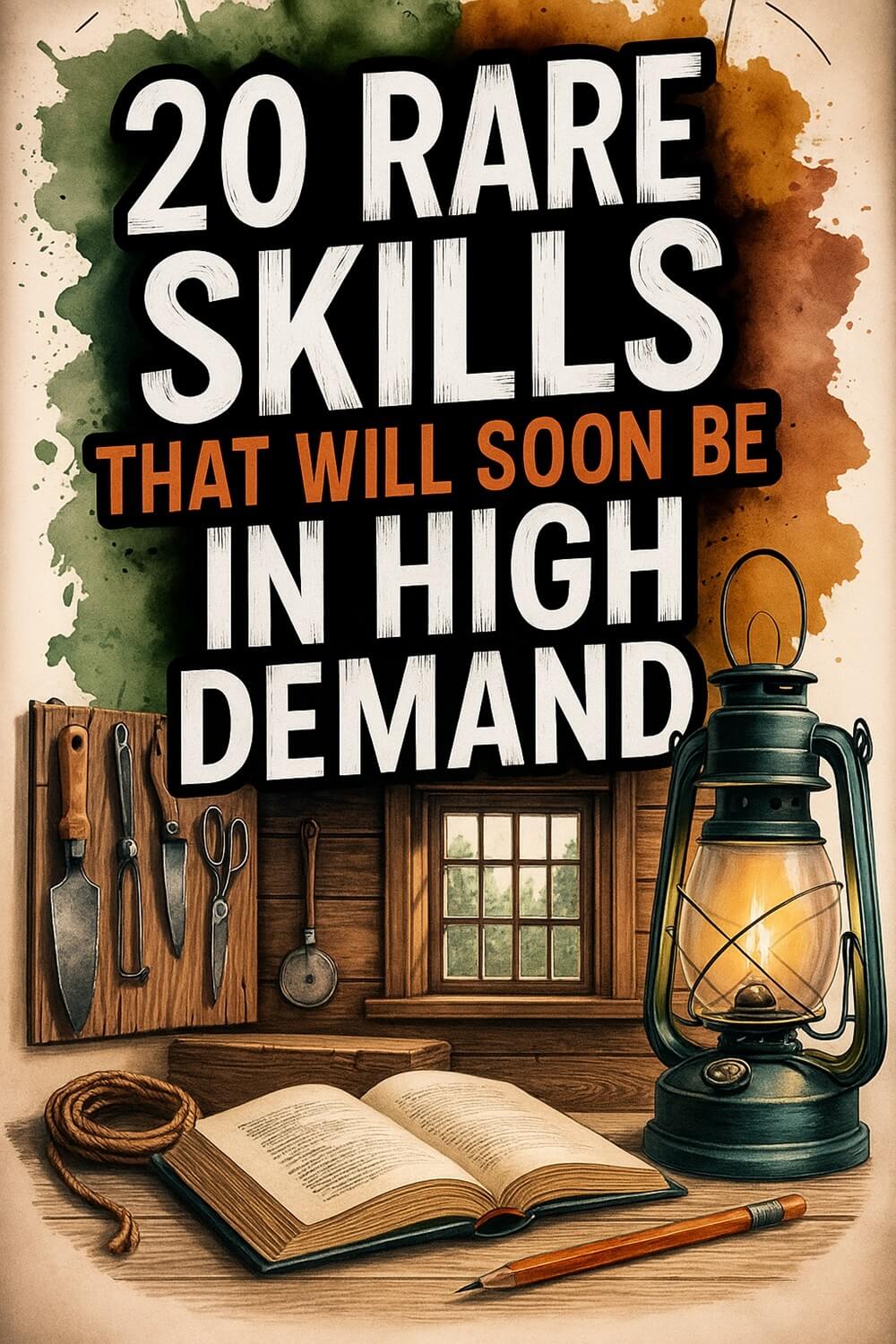




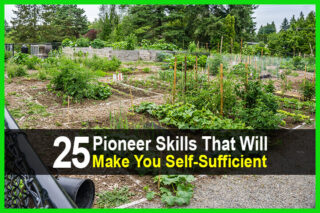


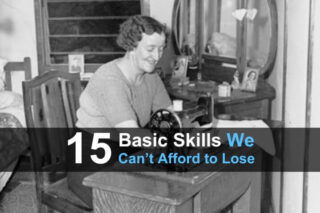
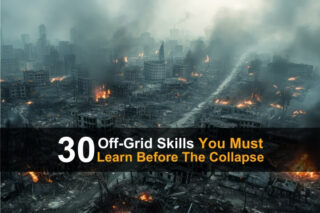

Skills I haven’t seen you cover on these lists:
Baking
Masonry
Brick making
Milling, both lumber and grain
Oil making for both cooking and fuel
Laundering
Firewood/fuel production
Each of these skills had dedicated tradesmen/women as late as the early 1900’s. These skills were linchpins of society and permitted the sustainment of people.
Spiritual guidance.
I enjoyed this article and thank God I have 13 of the 20 skills under my belt. I definitely need to learn canning and fermenting. I can probably hunt successfully but I don’t know anything about raising farm animals. I have land and will be there before Christmas.